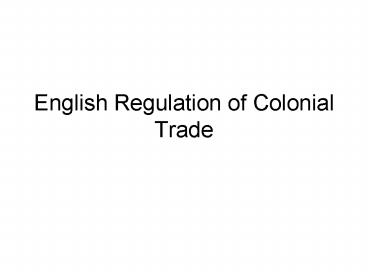English Regulation of Colonial Trade - PowerPoint PPT Presentation
1 / 13
Title:
English Regulation of Colonial Trade
Description:
English Regulation of Colonial Trade British treatment of the colonies during the period preceding the French and Indian Wars (aka Seven Years War) was called the ... – PowerPoint PPT presentation
Number of Views:148
Avg rating:3.0/5.0
Title: English Regulation of Colonial Trade
1
English Regulation of Colonial Trade
2
British treatment of the colonies during the
period preceding the French and Indian Wars (aka
Seven Years War) was called the salutary neglect
- Aka benign neglect
- Although England regulated trade and government
in its colonies, it interfered in colonial
affairs as little as possible.
3
The British considered their colonies in the West
Indies (which produced sugar and rum) to be more
important than their American colonies.
- England even occasionally turned its back to the
colonies violations of trade restrictions.
4
Thus, the colonies developed a large degree of
autonomy, which helped fuel revolutionary
sentiments when the monarchy later attempted to
gain greater control of the New World.
- However, in order to guarantee a favorable
balance of trade, the British government
encouraged manufacturing in England and placed
protective tariffs on imports that might compete
with English goods
5
Throughout the colonial period, most Europeans
who thought about economics at all subscribed to
a theory called mercantilism.
- Mercantilists believed that economic power was
rooted in a favorable balance of trade (that is,
exporting more than you import) and the control
of specie (hard currency such as coins).
6
Between 1651 1673, England passed the
Navigation Acts.
- Required the colonists to
- Buy goods only from England
- Sell certain of its products only to England
- Import any non-English goods via English ports
and pay a duty on those imports - Prohibited the colonists from manufacturing a
number of goods that England already produced. - In short, it sought to establish wide-ranging
English control over colonial commerce.
7
The Navigation Acts were only somewhat successful
in achieving their goal because it was easy to
smuggle goods into and out of their colonies.
- In the 1690s, the British took steps to
strengthen the Navigation Acts
8
(1) Set up vice-admiralty courts to try
violations of the Navigation Acts
- These were military-style courts, where
defendants were not entitled to a jury - The British considered this change necessary
because most colonial juries sided with the
colonists accused of smuggling, not with the Crown
9
(2) The British set up Boards of Trade to better
regulate colonial commerce.
- The Boards of Trade also reviewed colonial
legislation, revoking laws that conflicted with
British law, and administered government
appointments - Because the colonists understood and accepted the
concept of mercantilism, their protests to the
Navigation Acts and Board of Trade were not
strong - The colonists were entirely dependent on England
for trade and for military protection - Thus, they did not protest aggressively against
the Navigation Acts at the time
10
Despite trade regulations, the colonists
maintained a large degree of autonomy.
- Every colony had a governor who was appointed by
either the king or the proprietor - Although the governor had powers similar to the
kings in England, he was also dependent on
colonial legislatures for money - Also, the governor, whatever his nominal powers,
was essentially stranded in the New World - His power relied on the cooperation of the
colonists, and most governors ruled accordingly,
only infrequently overruling the legislatures
11
Except for Pennsylvania (which had a unicameral
legislature), all the colonies had bicameral
legislatures modeled after the British Parliament.
- The lower house was directly elected (by white,
male property holders), and its powers included
the power of the purse (control over government
salaries and tax legislation) - The upper house was made up of appointees, who
served as advisors to the governor and had some
legislative and judicial powers.
12
Most of these men were chosen from the local
population.
- Most were concerned primarily with protecting the
interests of colonial land owners. - The British never tried to establish a powerful
central government in the colonies. - The autonomy that England provided allowed the
colonies helped ease their transition to
independence in the following century.
13
The colonists did make some small efforts toward
centralized government.
- The New England Confederation is the most
prominent of these attempts. - Although it had no real power, it did offer
advice to northeastern colonies when disputes
arose among them. - It also provided colonists from different
settlements the opportunity to meet and to
discover and discuss their mutual problems.































